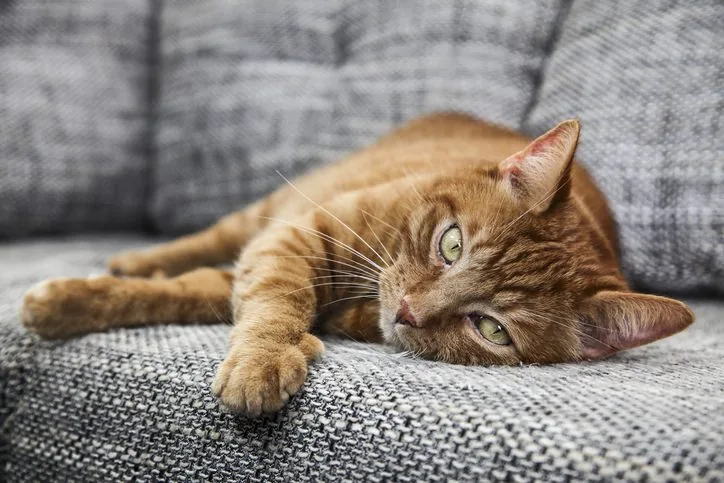Cat Constipation: Causes, Symptoms and Treatment in Warrick County, IN
Are you wondering if your cat is constipated? What can you do to help a constipated cat? Is this a serious problem, or is it something that will just clear up on its own?
Cat constipation is more common than you might think. Even though it is a common problem, it is important to help your cat combat this issue before it turns into an intestinal blockage. In the article below, you’ll find information about the causes, symptoms, and treatment of constipation in cats in Warrick County, IN. You can use this guide to try to manage mild constipation at home, or to decide when it’s time to see a vet about more serious constipation.

Causes
Read below to learn the main causes:
Low Fiber Diets
Cats who do not get enough fiber in their diets can experience more frequent constipation than other cats. This issue is most commonly seen in cats who exclusively eat wet food without any dry food to balance it out.
Frequent Hairballs
Long-haired cats or any cats who have frequent hairballs are much more likely to experience constipation than other cats. Hairballs may temporarily block the digestive tract and make it harder for cats to defecate until they are thrown up.
Spinal or Pelvic Pain or Injury
Some cats who have experienced a spinal or pelvic injury, or who have pain related to arthritis in these areas, may become constipated more often than others.
Megacolon
Megacolon is a condition that causes a weak colon and contributes to very frequent constipation in cats. Cats who seem to have chronic constipation without any of the other risks on this list may have megacolon. Only your vet can tell you for sure if your cat has this problem, however, so it’s best not to jump to conclusions until you have your cat checked out thoroughly.
Symptoms
Contact a veterinarian if you notice any of the symptoms below:
Straining to Defecate
Cats who strain to defecate are likely constipated. You may notice your cat sitting in the litter box for a long time before they finally exit, and this is typically the first indicator many cat owners notice when their pets are constipated.
Crying When Trying to Defecate
If your cat cries or yowls when they try to defecate, this is typically a sign of more serious constipation. Your cat is likely in pain from trying to defecate and needs some sort of medical help to resolve the issue.
Passing Blood or Very Little Stool
Cats who pass blood in the stool or who only pass a very small amount of stool, especially after straining, are likely constipated. If your cat’s stool has bright red blood, this is caused by straining. If the blood is dark red, this indicates damage to the intestines and should be treated by an emergency vet immediately.
Defecating Outside the Litter Box
Defecating outside the litter box may be a behavioral or anxiety issue, but it can also be associated with constipation. Your cat may mistakenly think the litter box is causing them bathroom issues and may try defecating elsewhere to see if it makes a difference. Do not punish your cat for this if they are dealing with constipation, as they can’t help it!
Treatment
Below are the main treatment methods:
Laxatives
For mild to moderate cases of constipation and recurring issues, your cat may be prescribed laxatives. Never give your cat human laxatives, but instead use cat-appropriate laxatives from your vet. Always follow your vet’s guidance for how much and how often to give this type of medication.
High Fiber Diets
Many cats respond well to high-fiber diets when dealing with chronic constipation. Your vet may prescribe this type of diet, but you can also try an over the counter option yourself to see if it helps clear up your cat’s constipation issue.
Medical Disimpaction
Your vet may need to sedate your cat and then use fingers or an enema to disimpact your cat’s colon. This process may help resolve acute cases of constipation, but won’t typically make a difference in long-term, chronic cases. Your cat may be given IV fluids during this process to help with dehydration related to constipation.
Medication to Stimulate the Colon
In severe cases of constipation in cats, and in cases of megacolon, cats may need to be given medication that stimulates the natural movements of the colon.
Seek Veterinary Care for Cat Constipation
Constipation in cats doesn’t have to be a serious problem, but it can be if it’s left untreated for too long. If your cat is unable to defecate for more than two days, see a vet or emergency vet, as they may have an intestinal blockage. Additionally, if your cat seems to be in a lot of pain when they try to defecate, see a vet as soon as possible.
Your vet can help you understand what’s causing your cat’s constipation and work to resolve the underlying issue while treating the symptoms at the same time. For more information or if you would like to speak to a veterinarian, contact Warrick Veterinary Clinic by calling (812) 897-4855. Our team will always be here for you and your pet.
